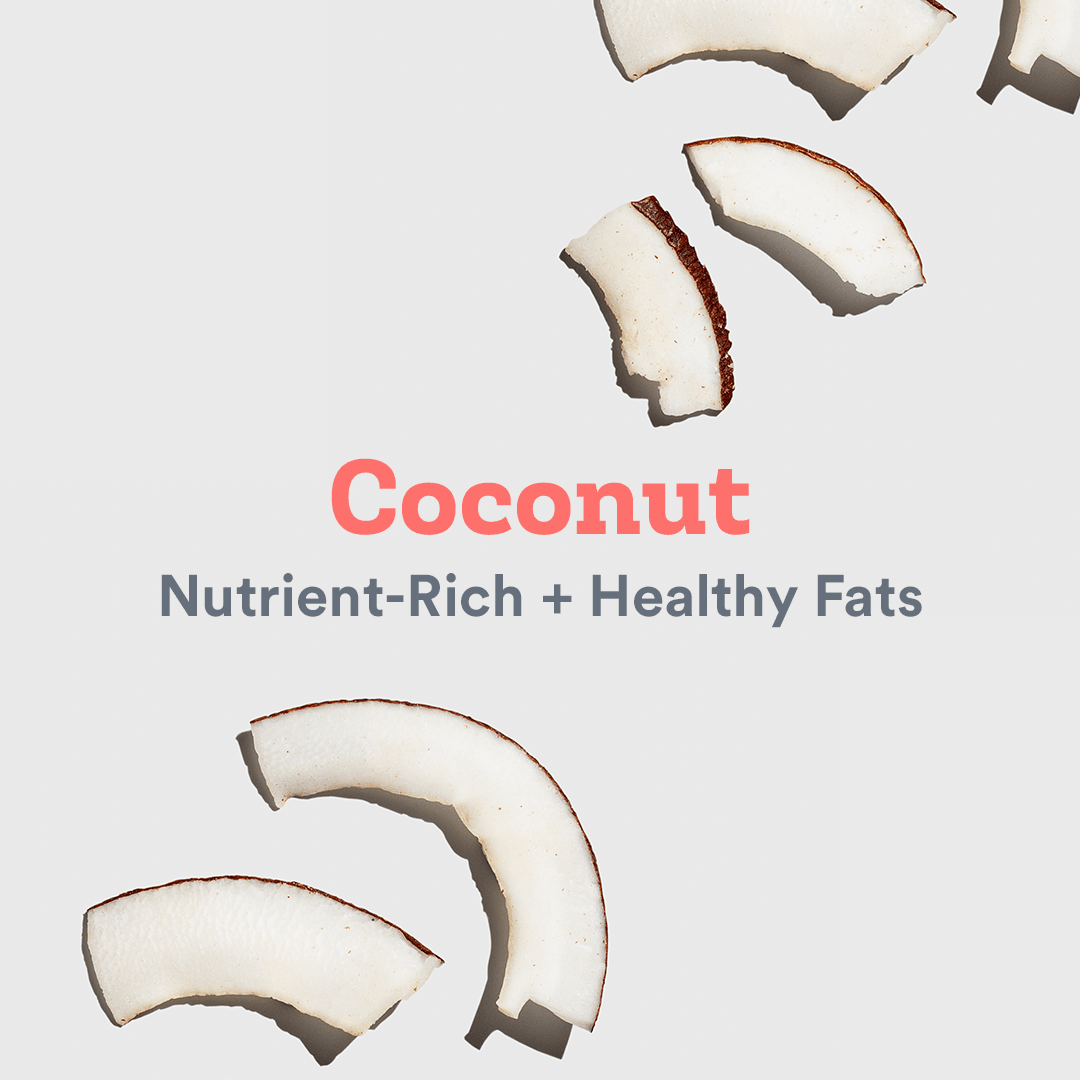
Scientific/Latin name: Cocos nucifera
Also known as: Coconut palm, Cocos,
Native to: Central Indo-Pacific Region
Parts used: Coconut meat/flesh, Coconut water, or processed for oil and plant milk from the meat. Charcoal from the hard shell, and coir from the fibrous husk.
Top benefits: Source of healthy fat, brain & cardiovascular health and nutrient rich

Coco-loco. The ingredient the world is nuts about.
Coconut (Cocos nucifera), a member of the Arecaceae (palm tree) family, is a tree that is cultivated for many purposes. While all of its parts are used in some way by the populations of traditional coconut growing areas, its nutritional and medicinal values are coconut’s primary uses, providing food for millions of people living in tropical and subtropical regions. The coconut kernel (meat) and coconut water have been found to have numerous medicinal properties such as antibacterial, antifungal, antiviral, antiparasitic, antioxidant, liver-protective and immune-stimulating. They also contain microminerals and nutrients important to human health, so much so that the coconut palm is aptly referred to as “Kalpavriksha” (the all giving tree) in Indian classics.
In India, coconut’s use for food and in Ayurvedic medicine were documented over 4,000 years ago. It has a long standing use in Indian folk medicine, believed to have a number of beneficial properties, including the ability to treat bronchitis, fever and gum disease, and in Ayurveda, the oil, cream and water are all used to treat hair loss, burns and heart problems.
Health Benefits of Coconut
Nutrients
Dried coconut meat is comprised of approximately 65% fat (see “Healthy Fats” below), boasts 16% dietary fibre, and provides 7% protein. It’s also a substantial source of certain minerals, with every 100 g of coconut providing about 30% of the Recommended Dietary Allowance (RDA) of phosphorus, 11% RDA of potassium and 18% (men) to 25% (woman) RDA of zinc.
Healthy Fat & Brain Health
While the optimal level of consumption of different types of fats is a hotly debated topic, research has shown that from metabolism to brain function to cardiovascular health, fat is an essential macronutrient with powerful effects throughout the entire body. This is because the membrane structure of all of the cells in our body is significantly made up of fat, and specifically saturated fat. Without a sufficient amount of saturated fats, our cells would literally collapse, preventing nutrients from flowing in and out and causing the cells to die.
Coconut oil is primarily composed of saturated fat (about 92%), with approximately 65% being medium-chain fatty acids (MCT), making coconut oil unique among dietary fats. MCTs are directly absorbed from the intestine and sent straight to the liver to be metabolized for energy production.
The result of the quicker metabolism of MCTs is that instead of being deposited as fat throughout the body (as other fats are), the energy created from MCTs is efficiently converted into fuel for immediate use by organs and muscles. MCTs enhance the formation of ketones in the body, which are a non-sugar fuel source. Fats can’t pass the blood-brain barrier, which is why the brain depends primarily on glucose. However, when glucose is deficient in the body (i.e. during ketosis), ketones provide an important alternative energy source for the brain. Moreover, while research is still in its infancy, evidence from a number of studies suggests that ketones may be beneficial in connection with neurodegenerative disorders such as Alzheimer’s and Parkinson’s disease, and may also play a protective role in traumatic brain injury and stroke.

Cardiovascular Health
The term “cholesterol” often has a negative connotation. However, cholesterol is produced by virtually all cells in the body, and is required for multiple key functions, including cell membrane integrity, to produce bile (crucial for digestion), steroid hormones and vitamin D, and as an antioxidant when the body’s levels are depleted.
Certain kinds of saturated fats are often considered “good fats” because they have been shown to increase levels of high-density lipoprotein (HDL) cholesterol in the body. HDL cholesterol is commonly referred to as “good cholesterol” because it removes deposited LDL cholesterol from arteries, which could otherwise accumulate, resulting in blockages and increasing the risk of cardiovascular disease (CVD). An increasing body of research suggests that rather than total blood cholesterol levels, the more important risk factors in CVD appear to be (1) the relative amount of HDL cholesterol to LDL cholesterol, (2) the size of the LDL particles, and (3) the nature of the LDL particles (for example, whether they have become damaged through oxidation).
While the science is inconclusive due to flaws in many of the studies to date (including structure of study and nature of the oil used), a growing body of research from animal and human models suggests that coconut oil has a beneficial effect on the ratios of HDL to LDL cholesterol and total to HDL cholesterol, and that that coconut oil may help reduce LDL oxidation.(1, 2, 3, 4) Moreover, coconut oil offers antioxidant properties, helping to reduce inflammation in the body resulting from free radical damage, which can contribute to CVD.
JOYÀ products that feature Coconut
The health research presented in this article is for informational use only. It is not a replacement for professional health advice and should not be construed as a recommendation of specific products. The products sold on this website are not intended to diagnose, treat, cure, or prevent any disease. This information does not provide dosage or format recommendations or possible drug interactions, and accordingly, should be used with the advice of a qualified health care practitioner.


